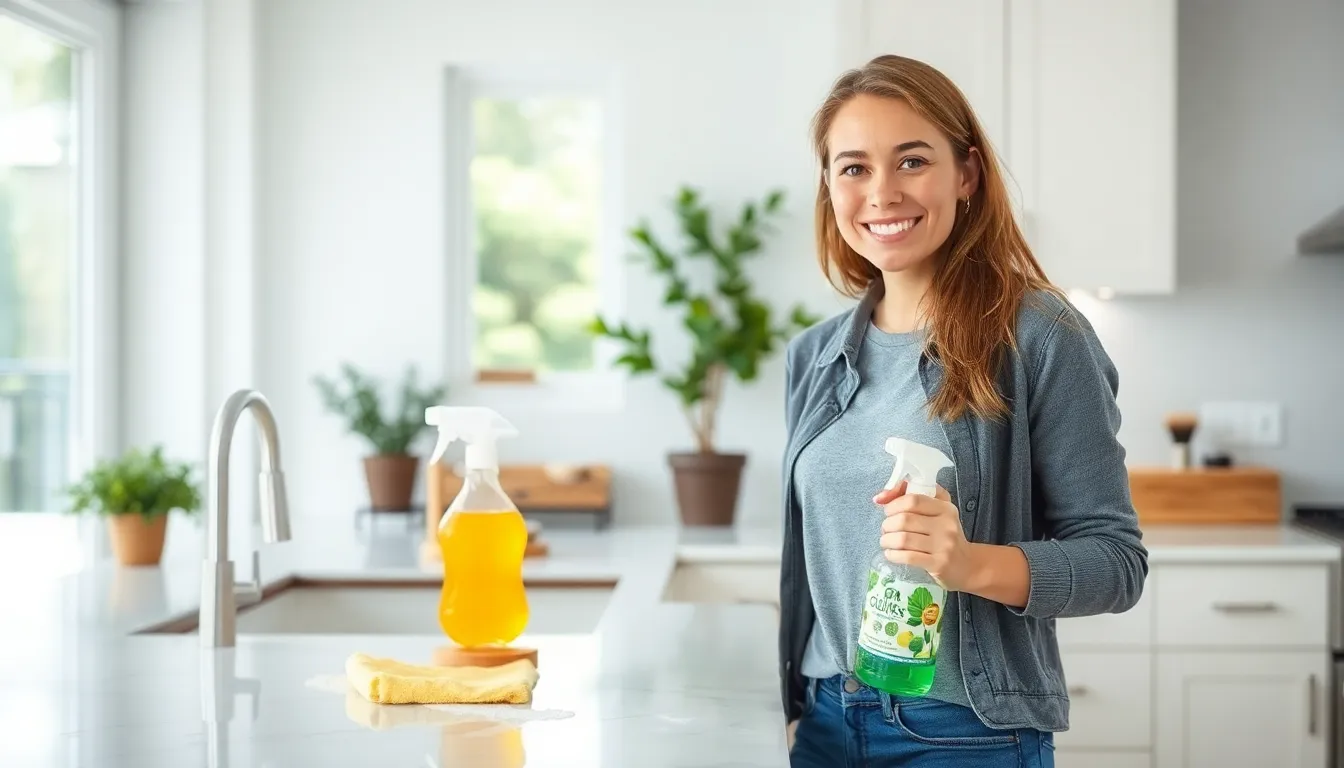In a world where the quest for a spotless home often involves a toxic cocktail of chemicals, eco-friendly cleaning emerges as the superhero we didn’t know we needed. Gone are the days of scrubbing with hazardous substances that could double as a science experiment gone wrong. With eco-friendly products, cleaning can be both effective and gentle on the planet, proving that saving the Earth doesn’t have to come with a side of guilt.
Imagine sparkling surfaces that smell like a garden rather than a chemical factory. Eco-friendly cleaning isn’t just a trend; it’s a lifestyle choice that keeps homes fresh while protecting Mother Nature. So why not swap out those harsh cleaners for something that’s kinder to the environment? Embrace the green revolution and discover how easy it is to keep your space clean without compromising on safety or sustainability.
Table of Contents
ToggleOverview of Eco-Friendly Cleaning
Eco-friendly cleaning encompasses the use of products and methods that safeguard health and the environment. Such products typically feature natural ingredients that break down easily and pose minimal risk to water sources and ecosystems. Consumer awareness about harmful chemicals in traditional cleaners drives the demand for safer alternatives.
People increasingly choose eco-friendly options due to their effectiveness and safety. Numerous studies show that these products perform as well as conventional cleaners while reducing exposure to toxic substances. For example, a study published in the Journal of Environmental Health found that the use of green cleaning products can significantly lower airborne chemicals in households.
Various eco-friendly materials serve as the foundation for cleaning products. Vinegar, baking soda, and essential oils rank high among popular ingredients that provide effective cleaning without harmful effects. Companies producing eco-friendly cleaners often emphasize transparency, revealing their formulas to reassure customers about safety.
The shift toward sustainable cleaning practices correlates with broader environmental concerns. Consumers now prefer brands that prioritize sustainability in their manufacturing processes. Many of these brands utilize recyclable packaging and engage in sustainable sourcing of ingredients.
Adopting eco-friendly cleaning extends beyond just products. Techniques such as using microfiber cloths, minimizing water waste, and optimizing cleaning schedules enhance efficiency while remaining environmentally responsible. By prioritizing these approaches, households attain cleaner living spaces and contribute to a healthier planet.
This growing awareness fosters a cleaner future, reinforcing the notion that responsible cleaning choices positively impact well-being and environmental health.
Benefits of Eco-Friendly Cleaning

Eco-friendly cleaning offers numerous advantages for both health and the environment, making it a wise choice for conscientious consumers.
Health Advantages
Switching to eco-friendly cleaning products reduces exposure to harmful chemicals that can lead to respiratory issues and skin irritations. Natural ingredients like vinegar and baking soda clean effectively while minimizing health risks. Products free from synthetic fragrances and dyes contribute to improved indoor air quality. Families with children and pets benefit significantly from using non-toxic alternatives. Long-term exposure to conventional cleaners poses potential health hazards, while eco-friendly options enhance overall well-being. Adopting these healthier solutions empowers individuals to create safer home environments for themselves and their loved ones.
Environmental Impact
Eco-friendly cleaning products lessen the burden on ecosystems by utilizing biodegradable materials that break down without harming wildlife. Traditional cleaners often contain harsh chemicals that contaminate water sources, whereas their eco-friendly counterparts minimize this risk. Using sustainable manufacturing practices supports progressive brands focused on environmental responsibility. Reduced packaging waste from concentrated formats further enhances the positive impact on landfills. Shift toward eco-friendly cleaning aligns with global efforts to combat pollution and climate change, contributing to cleaner, healthier communities. Adopting these practices promotes long-lasting preservation of natural resources for future generations.
Common Eco-Friendly Cleaning Products
Eco-friendly cleaning products utilize safe ingredients that are effective and sustainable. Consumers increasingly favor these products due to their health benefits and environmental safety.
Natural Ingredients
Natural ingredients form the backbone of eco-friendly cleaning solutions. Vinegar acts as a powerful disinfectant, effectively cutting through grease and grime. Baking soda serves as an abrasive cleaner, tackling tough stains without scratching surfaces. Essential oils, such as tea tree oil and lavender, provide antimicrobial properties and a pleasant scent. Castile soap, made from vegetable oils, effectively cleans various surfaces. Lemon juice adds natural antibacterial qualities and leaves a fresh aroma. Together, these ingredients pose minimal risks to water sources, aligning with eco-conscious practices while delivering robust cleaning performance.
Brand Recommendations
Several brands prioritize sustainability in their cleaning product lines. Seventh Generation offers a full range of non-toxic cleaning products that feature plant-based ingredients. Mrs. Meyer’s Clean Day provides effective formulas with essential oils for delightful scents. Ecos is known for its biodegradable, eco-friendly cleaning liquids. Method products come in recyclable packaging and emphasize natural ingredients. The Honest Company prioritizes non-toxic formulas safe for families. Consumers looking for sustainable options will find that these brands combine effectiveness with environmental responsibility, enhancing cleaning experiences without compromising values.
DIY Eco-Friendly Cleaning Solutions
Creating effective and safe cleaning solutions at home uses simple, natural ingredients. These alternatives provide powerful cleaning without synthetic chemicals.
Recipes for Household Cleaners
- All-Purpose Cleaner: Mix one cup of vinegar with one cup of water in a spray bottle. This solution cleans countertops, sinks, and appliances effectively.
- Glass Cleaner: Combine two tablespoons of vinegar with two cups of water. It leaves windows and mirrors streak-free.
- Bathroom Cleaner: Use a paste made from baking soda and water. Apply it to surfaces, let it sit, then scrub for a sparkling finish.
- Disinfecting Spray: Mix one cup of water, one cup of vinegar, and 10 drops of tea tree oil. This spray disinfects surfaces and neutralizes germs.
Tips for Effective Use
Using homemade cleaners enhances both effectiveness and safety. Always test a small area before full application to prevent surface damage. Spraying the solution and allowing it to sit for a few minutes helps break down stubborn stains. Employ microfiber cloths for best results; they trap dirt without scratching surfaces. Lastly, store cleaners in labeled bottles to ensure proper use and safety.
Embracing eco-friendly cleaning is not just a trend but a vital step towards a healthier home and planet. By choosing natural ingredients and sustainable practices, individuals can significantly reduce their exposure to harmful chemicals while maintaining a clean environment. The effectiveness of these products proves that safety and performance can go hand in hand.
As awareness grows and more brands commit to sustainability, the shift towards eco-friendly cleaning solutions becomes easier and more accessible. Making small changes in cleaning habits can lead to substantial benefits for both personal health and the environment. Every effort counts in the journey towards a cleaner future, and adopting eco-friendly cleaning is a powerful way to contribute to a sustainable world.



